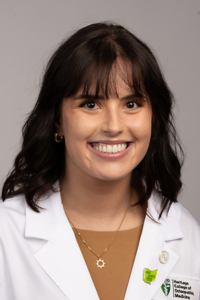Addressing Mistreatment and Advancing LGBTQ+ Healthcare in Osteopathic Medicine
Published June 25, 2024
Inside OME

Caitlin Pastor, OMS II, Ohio University Heritage College of Osteopathic Medicine – Cleveland
The mistreatment of LGBTQ+ patients in healthcare settings is a damaging issue that persists in today’s society, with significant consequences. Often, these issues occur not behind closed doors, but are observed by residents, medical students and staff. I witnessed an employee deliberately refer to a patient by the wrong pronouns, even after the patient corrected them. The patient’s expressions shifted from frustration to anger as the employee continued to insult them. The employee did not notice. This resulted in the patient leaving the office before seeing the provider. Their chief health complaint was unheard and never addressed.
My medical education illuminated for me how mistreatment in the healthcare setting leads to aftereffects that substantially impact LGBTQ+ population health. This experience sparked my determination to raise awareness and educate others. Hopefully, these efforts will lead to a solution. My contributions have been to educate students through data-driven presentations, physician panels and organizational involvement.
I applied for and received a scholarship within the Office of Diversity and Inclusion at Ohio University Heritage College of Osteopathic Medicine (OU-HCOM) that allowed me to create a project advocating for better LGBTQ+ healthcare. My project involved presenting research on LGBTQ+ patient health disparities and coordinating a physician panel to discuss these issues with presentation attendees. Students attended this presentation in-person and virtually to learn about the current data in LGBTQ+ care, hear anecdotes from practicing physicians, understand barriers to care and engage in discussions. The event aimed to educate other students and faculty members at all OU-HCOM campuses on ways they can contribute to spreading awareness, educating others and utilizing local resources.
The Medical Student Pride Alliance connects medical students across the country who are passionate about providing the best quality care to LGBTQ+ patients. When I started at OU-HCOM on the Cleveland campus, there was no active club for medical students interested in LGBTQ+ medical care. Another student and I reactivated the previous club, Ohio Pride: A Chapter of Medical Student Pride Alliance (Cleveland). Starting this fall, the club will hold events such as physician speakers, volunteer activities centered around the LGBTQ+ community and networking opportunities. The club offers membership to anyone, both members of the LGBTQ+ community and allies, interested in improving LGBTQ+ healthcare. The goal of the club is to continue learning about relevant data, express support and connect with physicians.
Recognizing and celebrating Pride Month in osteopathic medical education is essential to shaping the osteopathic values and knowledge of future physicians. On my first day of medical school, it was emphasized that the patient always comes first. “It is a patient-physician relationship, not physician-patient relationship,” echoed throughout my first year. Placing your patients and their wellness above your own opinions and biases is crucial when treating any patient. Ensuring that you are inclusive and non-judgmental is a fundamental part of developing a patient-physician relationship, especially when treating patients within the LGBTQ+ population. As a physician, you may be unaware of the previous mistreatments or disrespects that LGBTQ+ patients have faced and the barriers they have overcome to seek medical attention.
Sometimes asking someone’s pronouns at the start of a visit is enough to rewrite one’s negativeviews on healthcare providers due to prior experiences. As an osteopathic physician, your duty is to provide holistic care to all patients, tending to their mind, body and spirit. Disregarding a patient’s sexuality or gender identity will not allow you to create a trusting relationship or provide them with the best care possible. Celebrating your patients during Pride Month and recognizing their diverse identities is what it means to be an osteopathic physician.
Hopefully, these steps toward equality will help address health disparities and allow all patients within the LGBTQ+ community to receive the best medical care possible.
